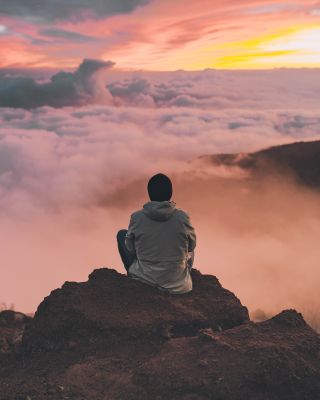Happiness
How Far Would You Travel for Happiness?
Writer Pico Iyer on travel, the good life, and finding home.
Posted November 8, 2023 Reviewed by Davia Sills
Key points
- Happiness doesn’t come from being sought—it finds you.
- Seeing beauty in the ordinary is about a way of being that involves "importing eyes of wonder."
- Life is defined not by what happens to someone, but by what they do with what happens to them.
- By coming into stillness, one can build key inner resources, such as compassion, clarity, and resilience.
At the Ryoan-ji temple in Kyoto, Japan, four characters are inscribed on a 17th-century stone wash basin that points to a key Buddhist teaching: What I have is all I need.

Yet, most of us spend our lives seeking. Fueled by familiar needs—happiness, healing, hope, home—our quests turn us into permanent wanderers, scouring unfamiliar landscapes for “You have arrived” signs.
Writer Pico Iyer has been a wanderer for half a century. As a child, his between-cultures upbringing gifted him “three sets of eyes.” As an adult, his extensive sojourns—whether solitary or in the company of the Dalai Lama—taught him about our common humanity, the illusion of living in a small world, and not taking anything for granted. In his latest book, The Half Known Life: In Search Of Paradise, Iyer reflects on the possibility of our eventual arrival and the unexpected coordinates of paradise.
Here’s Pico Iyer on travel, the good life, and finding home.
What do you know about happiness now, after decades of seeing the world, that you didn’t know before?
I’ve learned that happiness doesn’t come from being sought. It finds you. Happiness is absorption: forgetting yourself, losing track of time, and letting go of your defenses, ideas, and even identity. Happiness is the contentment that comes from not needing to be anywhere other than where you are and not needing anything more than what you have.
I’ve also learned that happiness has to do with managing expectations. If you assume that reality involves suffering, you’ll have less disappointment and will probably meet happiness more easily.
How can we wake up and fall in love with the world right here, wherever we find ourselves?
Seeing beauty in the ordinary is about a way of being. It involves importing eyes of wonder: Imagine you’re a foreign guest visiting your neighborhood. During the pandemic, just as people found magic and surprise in the places that they had been sleepwalking through for many years, I realized that what was along the road where my mother lived was as remarkable as anything I’d traveled halfway across the world to see.
Think of how attention quickens when you fall in love. You lose your head over somebody, and suddenly, you notice every detail about them—and about the world. What I’m talking about is almost the opposite—choosing to bring your attention to everything around you and, thus, falling in love with it. Too often, we notice the things that are going wrong in our lives and project our desires everywhere else.
“The writer’s job,” you write, “is to dismantle the very notion of an Other by showing how your hurts belong to me, as my hopes do to you.” How can we become the beneficiaries of our differences?
In relation to the other, most people have conflicting responses. One is to recoil, to contract, to be uncertain. The other is to be fascinated and drawn towards that which we don’t understand. I find that I’m prejudiced in favor of the other because of the immediate lure of the unfamiliar. I’d be more interested in meeting someone radically different from myself than someone who looks and sounds like me because I’d have much more to learn from them.
It’s exciting to discover a familiar truth in a foreign context. The Dalai Lama and an Anglican Vicar would probably tell me similar things about compassion. But I’d be more eager to learn from the man in exotic robes who speaks in his second language. It’s that mix of foreignness and familiarity that most of us are seeking in our lives. We need the familiar to comfort us, make us feel at home, and soothe our hearts. But we need the foreign to excite our minds and make us feel like we’re on an adventure.
You write, “The thought that we must die is the reason that we must live well.” What does it ultimately mean to live well?
For me, it means taking nothing for granted. Can I bring all of myself to this moment because I don’t know what will happen tomorrow? It’s a way of reminding ourselves that our time is limited and that we have little control over our external circumstances. Our life is defined not by what happens to us but by what we do with what happens to us.
Gradually, by trial and error, each of us finds what makes us fulfilled. We outgrow that sense that quantity of experience is more important than quality. Become honest with yourself—what can you let go and what can you let in so that at the end of your life, you’re not filled with regrets?
How can we find a sense of home in ourselves?
When my house burned down, and I lost everything I had in the world, I was reminded that home is not where you live. It’s what lives inside you. Home can be found in the constancy of relationships with friends and family. There have been times when I thought the English language was my home—after all, it’s kept me company every hour of my life. Home is my favorite song that keeps going around in my head, my favorite book that I can keep on reading.
Home is not necessarily the place where you were born or the place where you happen to be living right now. It’s the place where you never wish to be anywhere else. Home, I’ve also learned, isn’t related to belonging. I belong to England, where I was born and spent my first 21 years. Yet, I’ll never feel at home there. Meanwhile, I’ll always be a foreigner in Japan, yet I feel it’s my home—even without a sense of belonging.
I think finding home is like happiness—it finds you. It’s a matter of having your eyes open to it.

How can we embark on the inner journey in order to find the “heaven within”?
Every day, sit still for 20 minutes by yourself, without devices. That’s how you open space within and prepare yourself for the world that awaits you. I’ve made more than 100 monastery retreats over 32 years. Initially, I was excited to sit in solitude in a beautiful room above the radiant ocean. But soon, I realized that solitude was merely a means to deepen my connection to everyone and everything around me. By stepping away from the world, I learned to love it.
Coming into stillness is also how we build our inner savings accounts with key resources such as compassion, clarity, and resilience. As Meister Eckhart said 600 years ago, “As long as the inner work is strong, the outer will never be puny.”
Many thanks to Pico Iyer for his time and insights. Iyer is the author of 16 books translated into 23 languages and hundreds of articles for publications around the world. He has delivered four popular TED talks and taught at Harvard and Princeton.




